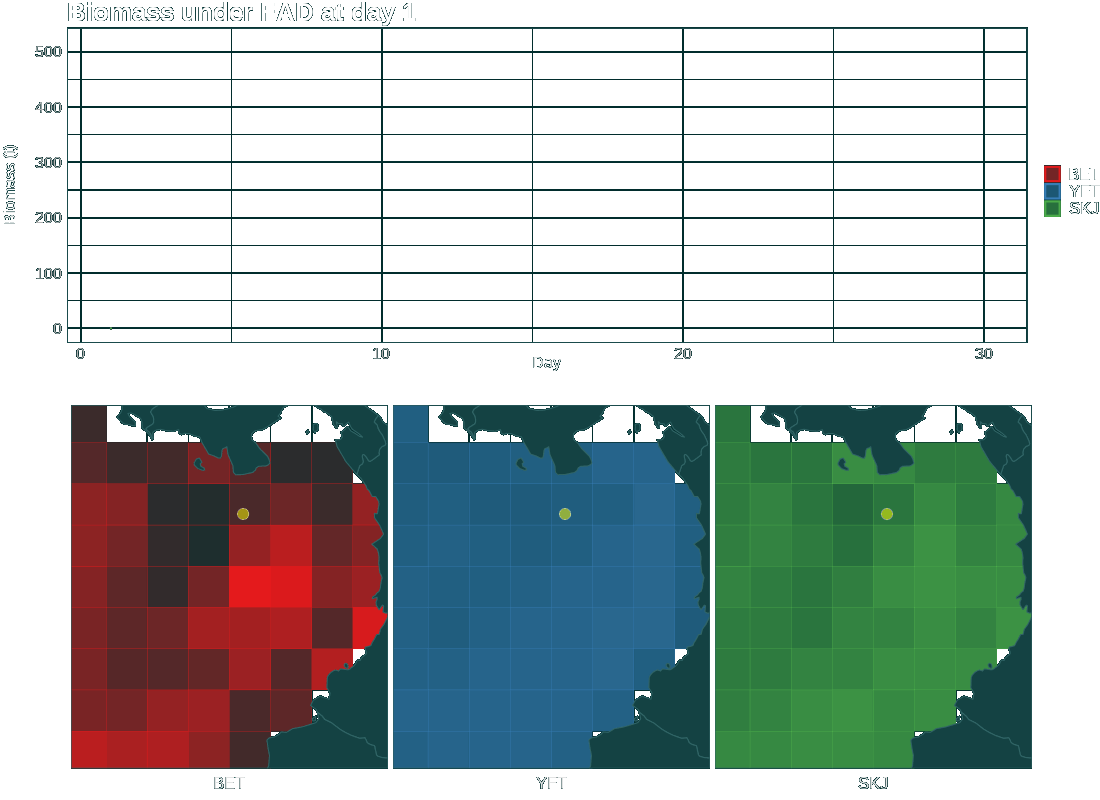
Complex Human-Environmental Systems Simulation Laboratory

POSEIDON - management of marine fisheries
We are using a combination of theoretical modelling and empirical data analysis approaches to investigate new practical approaches to fisheries management in a range of contexts. The extraction of ocean resources plays out as a complex interaction between ocean ecology, collections of individual fishermen, economics and policy. Finding management solutions which engender sustainability both ecologically and economically, in conditions which are dynamic and heterogeneous on a variety of temporal and spatial scales, is non-trivial and is the key problem that drives this research. We have built a sophisticated fisheries model which includes simplified aspects of ocean ecology (biomass), an individual-based fishing fleet, market interactions and policy effects.

One use of this model is as a ‘flight simulator’ for fisheries management strategies in both data-rich and data-poor contexts. We also use state of the art computational approaches, analysis of decision-making, and extensive engagement with stakeholders and policy-makers, to optimise and create policies for a range of sustainable target conditions. Model applications have so far included the US West Coast Groundfish, Indonesian Snapper and Pacific Tuna.
The POSEIDON model
The diagram to the right that shows some of the core elements of the POSEIDON model, including the policy analysis and optimisation components.
Example results
From an early conceptual version of POSEIDON, the clip to the left shows boats operating without constraint in an open-access fishery. Expanding fishing fronts naturally develops, where the trade-off between fuel costs and the exploration of virgin stock is balanced at different radial distances for larger and smaller boats. See Bailey et al. (2018) for further examples and discussion.
An example from an ongoing project in which we are adapting POSEIDON to simulate the Eastern Pacific tuna fishery. This fishery is characterized by the use of fish aggregating devices (FAD) and months-long ocean trips by purse seine vessels, requiring us to add models of oceanic currents and long-term agent planning capabilities to POSEIDON. The image shows the model domain and both boats and FADs distributed in the ocean.

Ongoing work
Current model applications include:
-
Indonesian snapper
-
Pacific Tuna
-
Management tool development with the Marine Stewardship Council
Indonesia
I
The Indonesian deep slope snapper-grouper complex comprises more than 50 fish species throughout the Indonesian EEZ. These are targeted by many competing fleets, from 1GT drop-liners to >60GT long-range long-liners.
POSEIDON is being applied to two important fishing management areas: 712 (the Java sea) and 718 (the Arafura sea).
The fishery is only lightly managed and even then asymetrically so: small boats require no registration while large boats are tracked via VMS.
The objective of this POSEIDON application was to demonstrate the ability of agent-based models to integrate theory and data even in scenarios where extremely few data points are observed.
Agent-based models have a reputation, not wholly undeserved, of being data-hungry; here we show this does not need to be the case.
In fact agent-based models are extremely useful to integrate limited ecological and limited economic data to better formulate management policies.
In the Java sea, the main target species (L. malabaricus and P. multidens) are in such a dire condition that urgent management is necessary. The problems are exacerbated further by the fishery being dominated by very small and cheap drop-liners who can remain in business even when the stocks are heavily depleted.
Our simulations however show the other side of this problem: while drastic actions may be needed these would quickly "pay for themselves" as even small biological improvements would generate increased profits for fishers within a few years.


The Arafura sea instead is dominated by larger boats but economic incentives push fishers to selectively target the worse off stocks.
The main tradeoff facing the policy-maker is that effort control can help rebuild some stocks but will also prevent fishers from fully exploiting already healthy species.
Moreover, successful rebuilding of all species cannot be achieved without targeted spatial measures.
We have had the privilege to present our work to stakeholders and to the Indonesian government as well as local fisheries academics. We benefited tremendously from working side by side with YKAN and their great catch-at-length data collection initiative
Eastern Pacific Tuna

Outputs
Publications
Bailey, Richard M., Ernesto Carrella, Robert Axtell, Matthew G. Burgess, Reniel B. Cabral, Michael Drexler, Chris Dorsett, Jens Koed Madsen, Andreas Merkl, and Steven Saul. 2019. ‘A Computational Approach to Managing Coupled Human–Environmental Systems: The POSEIDON Model of Ocean Fisheries’. Sustainability Science 14(2):259–75. doi: 10.1007/s11625-018-0579-9.
Carrella, Ernesto, Richard M. Bailey, and Jens Koed Madsen. 2019. ‘Repeated Discrete Choices in Geographical Agent Based Models with an Application to Fisheries’. Environmental Modelling & Software 111:204–30. doi: 10.1016/j.envsoft.2018.08.023.
Madsen, Jens Koed, Richard Bailey, Ernesto Carrella, and Philipp Koralus. 2019. ‘Analytic Versus Computational Cognitive Models: Agent-Based Modeling as a Tool in Cognitive Sciences’. Current Directions in Psychological Science 28(3):299–305. doi: 10.1177/0963721419834547.
Carrella, Ernesto, Richard Bailey, and Jens Madsen. 2020. ‘Calibrating Agent-Based Models with Linear Regressions’. Journal of Artificial Societies and Social Simulation 23(1):7. https://doi.org/10.18564/jasss.4150
Carrella, Ernesto, Steven Saul, Kristin Marshall, Matthew G. Burgess, Reniel B. Cabral, Richard M. Bailey, Chris Dorsett, Michael Drexler, Jens Koed Madsen, and Andreas Merkl. 2020. ‘Simple Adaptive Rules Describe Fishing Behaviour Better than Perfect Rationality in the US West Coast Groundfish Fishery’. Ecological Economics 169:106449. doi: 10.1016/j.ecolecon.2019.106449.
Madsen, Jens Koed, Richard Bailey, Ernesto Carrella, and Philipp Koralus. 2021. ‘From Reactive towards Anticipatory Fishing Agents’. Journal of Simulation 15(1–2):23–37. doi: 10.1080/17477778.2020.1742588.
Carrella, Ernesto. 2021. ‘No Free Lunch When Estimating Simulation Parameters’. Journal of Artificial Societies and Social Simulation 24(2):7. https://www.doi.org/10.18564/jasss.4572
Software
https://github.com/CarrKnight/POSEIDON
https://github.com/CarrKnight/discrete-choosers
https://github.com/nicolaspayette/DiscreteChoosersExtension
This project is part of the Oxford Martin School Programme on Sustainable Oceans, and run in close collaboration with Ocean Conservancy, along with partners in Arizona State University, UC Santa Barbara, and George Mason University.
Group members involved:
Ernesto Carrella, Nicolas Payette, Richard Bailey, Jens Madsen